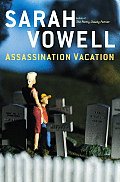 I decided to read Sarah Vowell’s Assassination Vacation as a distraction, primarily from a pretty dry biography of Samuel Heintzelman I’m reading (is using dry and Heintzelman in the same sentence redundant?). A few years back I read The Partly Cloudy Patriot by the same author, and really enjoyed it. Sarah Vowell is known for her work on public radio, and also as the voice of Violet Parr, the daughter in The Incredibles. Say what you will about her politics (but remember, you can’t say it here – see About, over to the right), she knows her US history, she can turn a phrase, and she’s funny. Very funny. And the content of the book is relevant enough that I am giving it space in my Civil War library, in the embarrassingly large Lincoln Assassination section.
I decided to read Sarah Vowell’s Assassination Vacation as a distraction, primarily from a pretty dry biography of Samuel Heintzelman I’m reading (is using dry and Heintzelman in the same sentence redundant?). A few years back I read The Partly Cloudy Patriot by the same author, and really enjoyed it. Sarah Vowell is known for her work on public radio, and also as the voice of Violet Parr, the daughter in The Incredibles. Say what you will about her politics (but remember, you can’t say it here – see About, over to the right), she knows her US history, she can turn a phrase, and she’s funny. Very funny. And the content of the book is relevant enough that I am giving it space in my Civil War library, in the embarrassingly large Lincoln Assassination section.
In addition, her approach to the subject is very similar to that of this blog, described earlier as pulling threads. That’s a kind of free form research, allowing the stories to lead you, going along for the ride. Vowell mentions in the book that a friend compared her ability to relate anyone and anything to Lincoln’s assassination to The Kevin Bacon Game, in which the object is to connect any given actor to Kevin Bacon by naming other actors they worked with until you hit one that worked with Kevin Bacon. I used to be pretty good at that game, and have long thought my processes when it comes to the study of the Civil War are much more similar to playing it than to any method taught in a school or writer’s workshop. The result is usually the revelation of unexpected, sometimes meaningful (sometimes not) relationships between people, places and things. Vowell excels in not only uncovering these interrelationships, but in weaving a compelling narrative from those threads.
Assassination Vacation chronicles Vowell’s travels to various places associated with three assassinated presidents, Lincoln, Garfield and McKinley. Her trips are to various and sometimes unexpected locations – like Alaska. She visits the one-time location of a strange, biblical sex-cult in New York (the Oneida Community) that served as a refuge for Garfield’s killer, Charles Guiteau. She explores the relationship between McKinley assassin Leon Czolgosz (shol-gosh) and anarchist Emma Goldman (Maureen Stapleton in Reds). She even goes to Mount Marcy in the Adirondacks, where Vice President Theodore Roosevelt was hiking when summoned to Buffalo as McKinley lay dying.
Vowell devotes the most pages to people, places and events surrounding the Lincoln assassination. She goes to the usual haunts, Ford’s Theater, The Wok & Roll restaurant (formerly Mary Surratt’s boarding house). She visits places that “used to be there”, like Secretary of State Seward’s DC home – that’s how she wound up in Alaska, I guess. Vowell treks to Philadelphia’s Mutter Museum (I now must go there). For God’s sake, she even sails to Fort Jefferson in the Dry Tortuga’s, where Dr. Mudd and other convicted conspirators were imprisoned. The descriptions of these trips are top notch, insightful, and often amusing (“I used to think John Waters movies were on the outlandish side until I came to Maryland”).
There are some drawbacks to the book, but they are relatively minor. For one thing, Vowell often ends sentences in prepositions and uses the aristocratic affectation “an” historian/historic. (I understand they’re teaching kids these days that the former practice is now “OK”, but I’ve never seen a style manual approving the latter, and I doubt she would write of “an” histrionic display or “an” hysterical outburst. And why do these people who say “an” historian invariably say “a” history? Huh? Why?) The other is the previously alluded to references to current politics. The fact is, parallels between today and the past can be made to say whatever one wants them to say. It’s a parlor trick.
For instance, Vowell makes much of the circumstances surrounding the presidential election of 1876. In what she views as a precursor of things to come, she notes that the Republican party essentially “bought” the election by agreeing to end reconstruction, thus “selling out” African Americans in the south. Factually correct, her analysis ignores the other end of the deal. In order for the Republicans to buy the presidency at the cost of reconstruction, someone had to accept payment and make delivery. Neither party was unsullied in the transaction.
All in all, Assassination Vacation appeals not only to those interested in Lincoln, or the Civil War era, or presidential history, but to any lover of history. If you’re one of those people who can’t understand why other people can’t understand that the fact that the stone wall over there is the same wall that was there when IT happened is, well, way cool, this book is for you.

Recent Comments